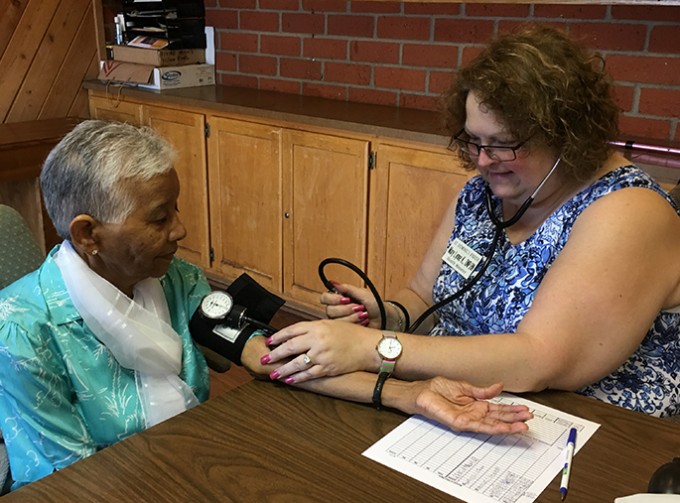Feature
Faith Community Nursing
Caring for the congregation

Mary Lynne Knighten, RN, DNP, PN, NEA-BC, serves as director of the health ministry of L.A.’s St. Dominic Catholic Church. Volunteering in this role is her way “to give back to our faith community.” As the “chief nurse,” Knighten oversees health screenings, makes referrals and organizes events like Blood Pressure Sundays, working with a group of other volunteers to improve the physical, emotional and spiritual well-being of church parishioners.
It was the late Granger Westberg, a Lutheran pastor, chaplain and theology professor, who first coined the term “wholistic” for healthcare that encompasses a patient’s body, mind and spirit. This integration of faith and health underlies the practice of Westberg’s other legacy: parish nursing, now more broadly known as congregational or faith community nursing.
Today, there are about 16,000 faith community nurses across the U.S. The ANA recognizes congregational nursing as a distinct nursing specialty, with its own standards of practice and an American Nurses Credentialing Center (ANCC) board certification program. Many congregational nurses are volunteers, but some are paid, credentialed employees of their church or ministry.
Caring for the Community
Faith community nursing has some similarities to public health and home health nursing, but the goal is to complement rather than replace those specialties. The congregational nurse’s central objective is to address the needs of their faith community, whether that means teaching parishioners about nutrition, addressing problems like diabetes or hypertension or helping seniors deal with declining health and mortality. Faith community nursing is very much a team effort.
Nurses work in close collaboration with faith leaders, other healthcare providers and lay volunteers. Many activities are organized around regular services. For example, after a weekly sermon, a church pastor might invite parishioners to stay for a free health screening, which the congregational nurse would then conduct.
Although faith community nurses work with and sometimes organize non-clinician health promoters, being an RN enables the nurse to provide a broader range of care and advocacy, such as holding weekly “office hours” to answer health-related questions or providing referrals to local health resources.
Sometimes, the nurse’s work is more hands-on. Deborah Ringen, RN-BC, MSN, FC, a faith community nurse for Visiting Nurses of the Lower Valley in Connecticut and an adjunct professor at Azusa Pacific University School of Nursing, recalls playing a health advocacy role for an older patient, accompanying her to appointments to explain what the doctors were saying and helping the patient ask the right questions. When treatment proved unsuccessful, Ringen was the one to propose hospice care.



